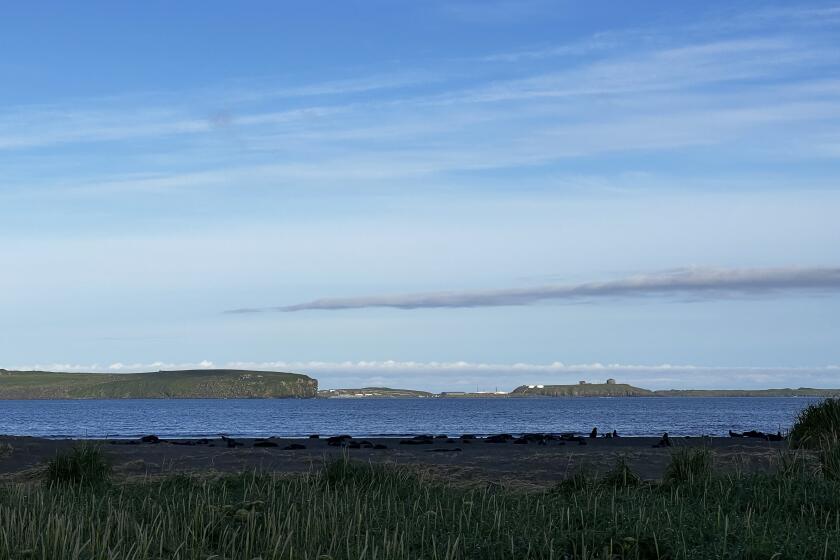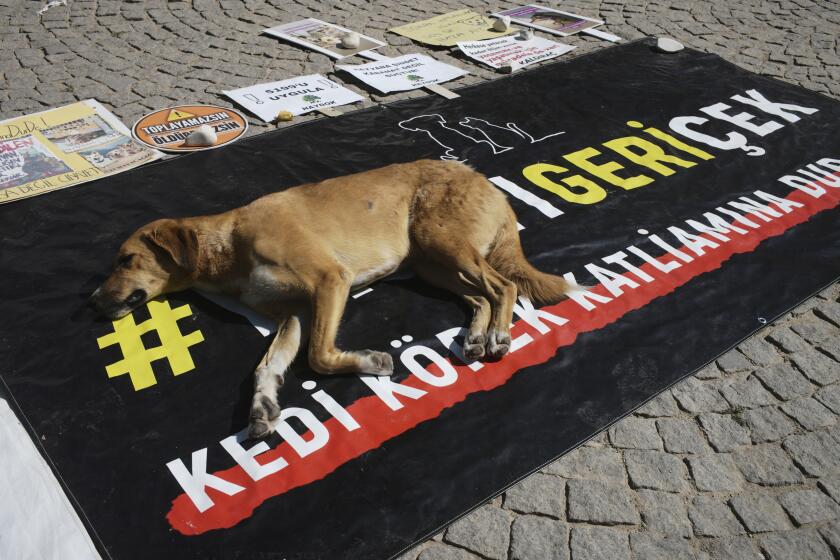Tall girls, more cattle
The man in the orange sunglasses and a fur hat with earflaps seemed more like a jazz musician on a cigarette break than a tribal chief, but as soon as he spoke, village men gathered for a lesson on brides, poor boys and cattle.
The shade was just right. John Modi Jubek crossed his legs, striking as regal a pose as a chief can when he’s sitting in a plastic chair. It was odd to him that a stranger didn’t know the Mundari tribe smiles more upon tall women than on short ones. A father may love his diminutive daughters, but affection does not bring longhorns and riches.
“Tall girls fetch more cattle because their daughters will quickly grow and can be married off to fetch even more cattle,” said the chief, shooing a stubborn fly. “A tall girl can command 60 to 100 cattle from a suitor. A short girl may get 20 head, and, sometimes, short girls overstay their welcome in the father’s home and end up fetching only five cattle. By then, a tall girl has already borne five children.”
The chief paused, letting daughter-cattle ratios sink in. The men shook their heads at his calculations.
The chief was wise, cool in the late morning heat, watching sunflower-high women brush beneath the branches of a big tree with jugs and food sacks balanced on their heads. They strode past a man selling padlocks and Jesus calendars; they glided beyond a short sister wobbling in the sunlight with a numb smile and alcohol on her breath.
“Things get competitive for a tall girl,” said the chief. “Once she reaches 12 years of age, men come to the father and promise many cattle. Of course, a suitor with no cattle will never marry. Our laws forbid that. He is single for life. If he sleeps with someone’s daughter or gets her pregnant, he’ll be killed.”
What do tall women think about marriage and cattle?
The chief bit his lip, bafflement drifting across his face.
“Women have no say,” he said.
The chief rules 500 families. Many are scattered miles away, tending cattle on the grasslands; others live in sheds and straw huts along a tangle of dirt alleys on the outskirts of Juba. The southern city is a pop-up shambles of ambition, mud walls and a haphazard airport skirted by the White Nile. The chief lives here but he doesn’t seem entirely at home among the goats and discos.
Juba is the heart of southern Sudan’s independence movement, seeking to break away from the northern-led national government in Khartoum. The chief’s power is crowded by soldiers and politicians who speak of tradition yet wear the suits and emblems of a new, nervous world. The Mundari and other tribes are caught between eras, a time when banks and paved roads are promised but children still die of malaria and malnutrition.
For centuries, the Mundari have swapped cattle for brides. But nowadays, when motorcycles pass alongside men with spears, daughters can be had for cash, especially among tribesmen seeking what passes for cosmopolitan life in a town where running water is considered an extravagance.
The chief is not opposed to things modern, but they often defy good sense and durable logic. Take the laws of police (too inflexible) and the rules of government (mind-bendingly bureaucratic and lacking insight into the nomadic soul).
“I still preside over drum playing and wrestling matches,” said the chief, who at times appeared to be sneaking a nap behind his tinted glasses. “But I used to mediate more family quarrels and misunderstandings. Many of these now go into the ‘system.’ It’d be better if I handled such cases among my tribesmen, because if you end up in state court you’ll pay a fine or wind up in jail, and then who will feed your family?”
The chief, lithe and tall but not as high as one of the prized women who strolled past him, sat back. It’s a burden to blend ancient customs with contemporary rules, but the men look to him to decipher what is right and what is not.
“My father was chief before me,” he said. “He ruled in a splendid time. He died 14 years ago and I took over when our southern Sudan was fighting a civil war with the north. It has not been good. Too much killing, too many hard days. I don’t even trust the peace we have now.”
At a wooden table beyond the chief’s voice, men drank homemade liquor and teenagers looked through stacks of cargo shorts and T-shirts. Children ran, litter blew, vendors rattled. When you stitch a village onto the edge of a town it becomes a mixed-up place, where the wisdom in the bush must be re-invented for quicker rhythms.
The chief stared at his tribesmen, including one whose feet glowed in white zip-up ankle boots. He sighed.
Two little girls in dresses, too young for suitors but growing toward a cattle price, slipped into a mud-walled hut. The chief was quiet for a while, breathing in the last cool strands of morning air, his fingers hanging from the armrest like knotted vines in a tiny garden. He coughed and looked to the horizon, not as wide or as filled with wonder as the one that hung over the plains of his childhood.
“A man sometimes with a few cattle will come to me and say, ‘Chief I have only three head, but I want to marry.’ I will go to my tribesman and ask them to contribute cattle so that this man may have his wish. It can be paid back later.”
The chief stood; lesson over.
The men wandered away, some toward tall women, others into nameless alleys that would never be drawn on a map. The chief walked out of the shade to a lone grave bordered by chicken wire. The dirt was swept, and although the chief didn’t say it, the plot meant that he’d have fewer tall granddaughters. One of his sons lay beneath, dead two years ago of yellow fever.
More to Read
Sign up for Essential California
The most important California stories and recommendations in your inbox every morning.
You may occasionally receive promotional content from the Los Angeles Times.









